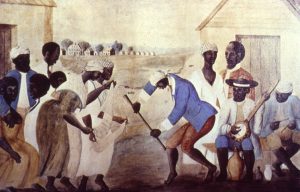The Gullah are African Americans from South Carolina and Georgia who are descendants of African slaves. Their descendants were forced to travel to this region due to a discovery by the European colonists that the Lowcountry region could sustain and grow African rice in large numbers. Many West Africans were experts in growing the highly demanded commodity and were targeted by the Europeans for this reason. During the 1800’s, the Gullah language and culture were formed as a coping mechanism for the every-day struggles they faced as slaves. The Gullah language was mixed with the English language and African dialects, and it is still spoken by the Gullah people on Daufuskie today. When you say words like “tote,””yams,” “okra,” and “goober,” you are speaking the Gullah language.

The Gullah gathering with one another to teach and engage with the language and culture.
Today, many of the lands that the Gullah have owned since emancipation are slowly being replaced by new housing projects. However, Daufuskie Island is unique in that many educational and conservationist groups are working to preserve and advocate for the Gullah’s home and culture. This is why many people love Daufuskie; the island’s residents believe in community, simplicity, and a natural way of living, just like the Gullah believed in and still live by.
If you’d like more information, watch the documentary trailor by the Gullah Museum of Hilton Head Island to learn more about the Gullah culture:
Hilton Head Island Back In The Day Trailer from Butch Hirsch on Vimeo.